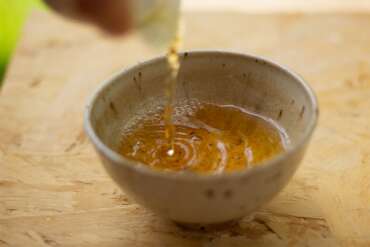It has been ages since I wrote something for the website so it was long overdue to write about another tea. I chose to get things going again by drinking something I don’t drink that frequently. I usually stick with puerh, hong cha or an occasional oolong/green tea, but I went for a hei cha from Anhua: the Hong Fu Jin Zhuan brick from Moychay.
Have you considered subscribing to Tea Adventures? You can enter your email address in the sidebar and get updates whenever I publish a new article. You never have to miss an article again by joining our mailing list.
Hong Fu Jin Zhuan
The most popular example of hei cha is puerh tea. However, puerh is not the only type as there are a lot of other supreme dark teas from all over China. The Hong Fu Jin Zhuan from 2016 is an example of dark tea from Anhua in Hunan Province. It’s tea that is usually tightly pressed into tea bricks and is fully fermented. One particular aspect worth noting is that this tea is characterised by its ‘golden flowers’ that are found on the tea leaves. If you look at the dry leaves, you see some golden grains. These grains are officially referred to as ‘Eurotium Cristatum’ and have a probiotic function. A lot of people believe that this tea is healthier than other types of tea just because of the probiotic fungi…
I’m brewing a piece from a large tea brick, so it was tightly compressed. The colour is very dark olive green and brown. I see some spots of ‘golden flower’ in there as well. The aroma is deep, warm, fruity and even a bit medicinal.
The aroma of the wet leaves is warming, sweet and it definitely has traces of red fruits. I’m surprised that the leaves are medium-sized. I expected them to be much smaller. The colour is more olive green now.
Tea Tasting
- 4.4g for a 90ml porcelain gaiwan
- 95°C water
- 2 rinses
- 6 infusions
Infusion 1 (15 sec): when this liquor enters my mouth, I immediately recognise the typical taste of Anhua Hei Cha. It’s slightly medicinal, but also a bit sweet. The most dominant flavour is similar to red berries. It’s not straight-up fruity because the medicinal notes add some spiciness to it. After drinking this one cup, I’m starting to feel really hot!
Infusion 2 (20 sec): the liquor is a bit cloudier in this one. It’s less sweet and the fruitiness has a sour edge to it. There are also some light medicinal notes in the background.
Infusion 3 (25 sec): it’s a bit sweeter again and the fruitiness is less prominent. I feel that the sourness has moved to the front and swapped places with the fruitiness. It’s sour (in a good way) with a fruity edge now.
Infusion 4 (30 sec): no big changes, but the sourness is gone. It’s a bit fruity and sweet with a spicy undertone. And again, I’m feeling very hot after drinking this infusion.
Infusion 5 (long): the flavours are a bit more intense, which is really nice. It’s more of the same; sweet and fruity in combination with some light medicinal notes.
Infusion 6 (long): more or less the same as infusion 5. Still delicious!
Don’t know where to buy tea online? I made a page on the website with over 200 online shops and I keep updating it regularly. You can check it over here.
Conclusion
I don’t drink Anhau Hei Cha often, but I really enjoy it from time to time. This one has a taste that is characteristic for this type of tea, so you’ll instantly recognise it, even when you’re doing a blind session. Because of this characteristic flavour profile, I’m not keen on drinking it every day because I think I would get bored of the taste pretty quickly. However, it’s nice to drink once in a while. This one had no unpleasant flavours and I experienced sweet and fruity notes in combination with medicinal flavours. There were also some spices and a sourness that added extra character to the already great tea. In conclusion: this is a solid tea!
Unfortunately, this particular tea is sold out now. If you’re looking for something similar, they have some other dark teas on offer.

Leave a Reply